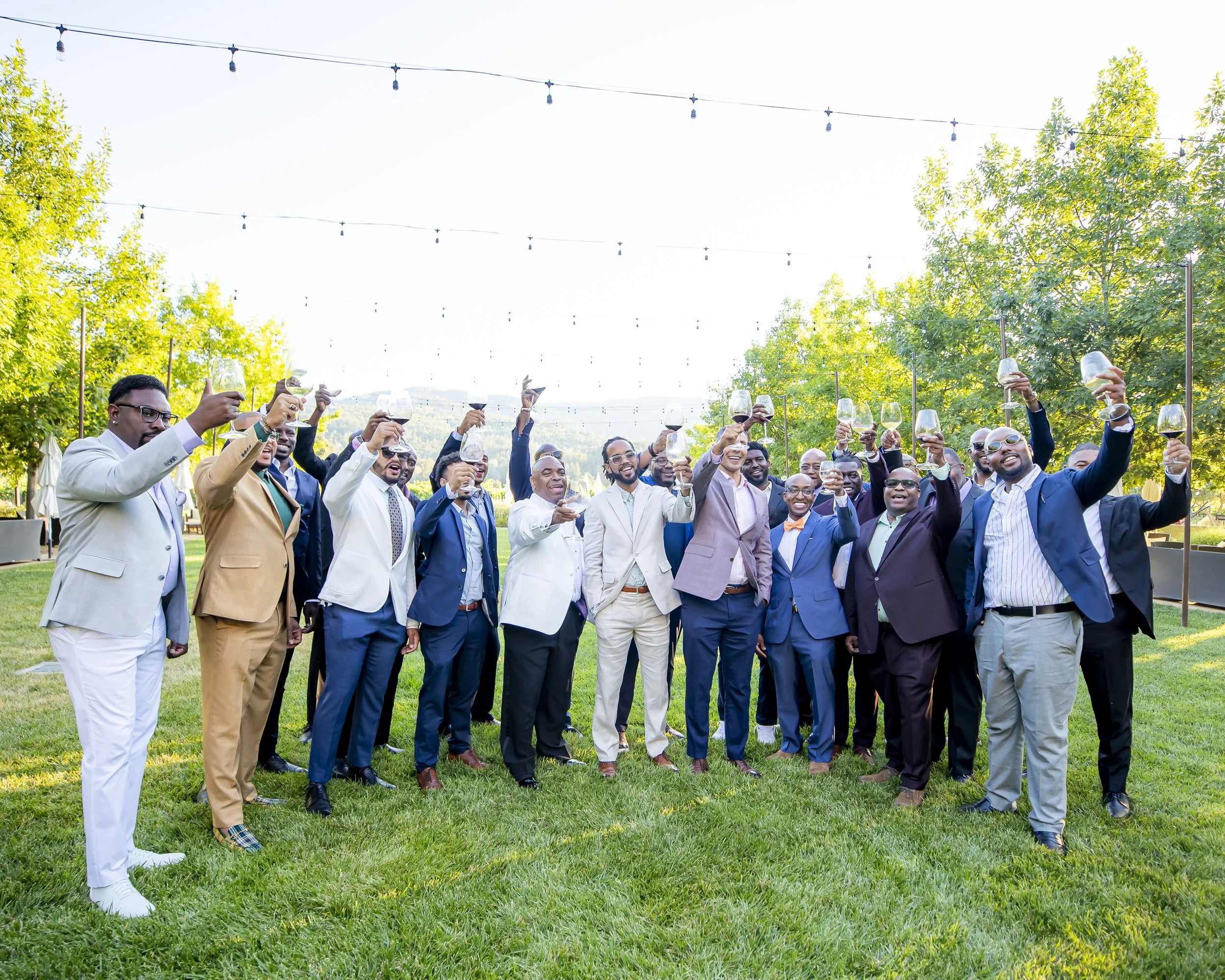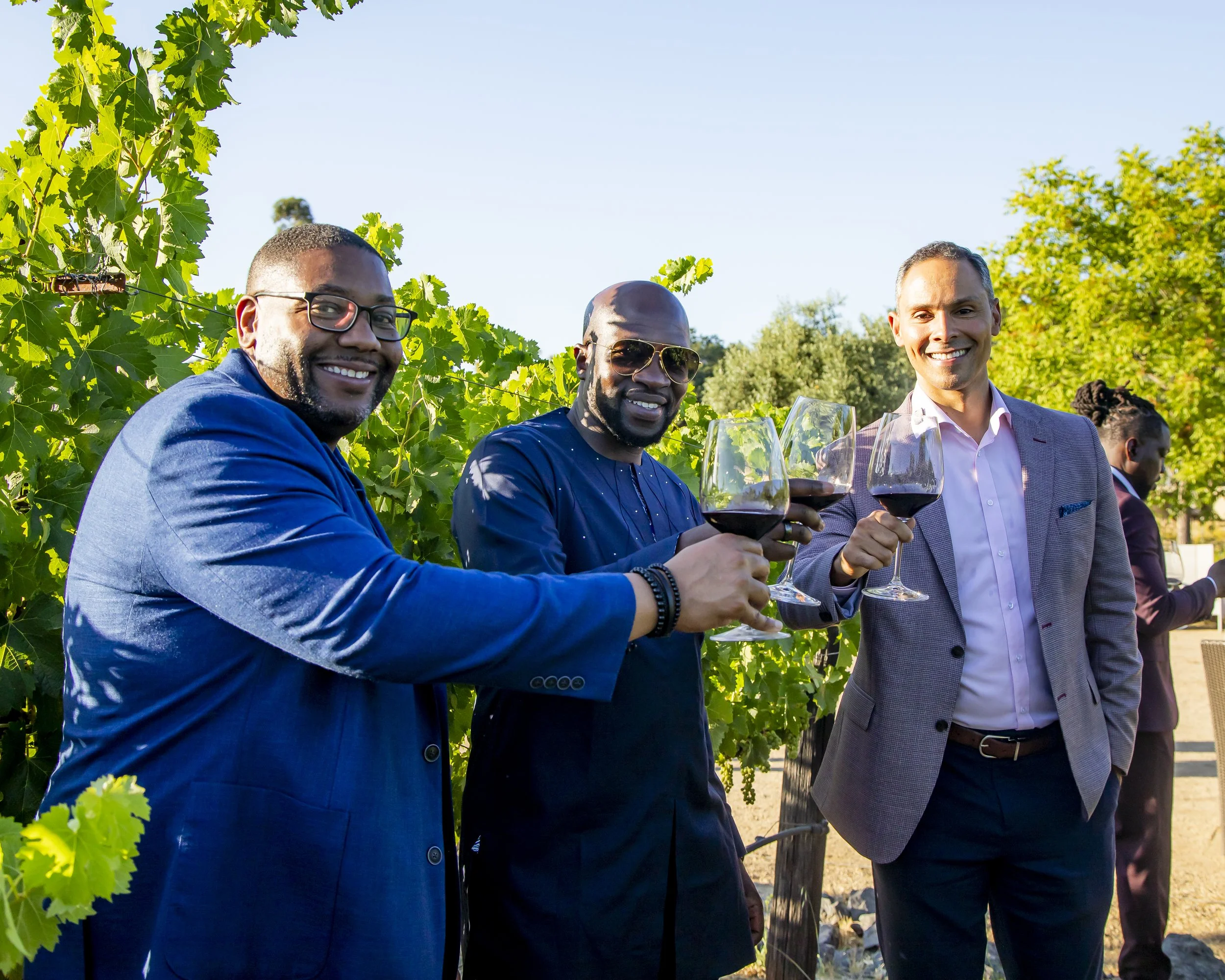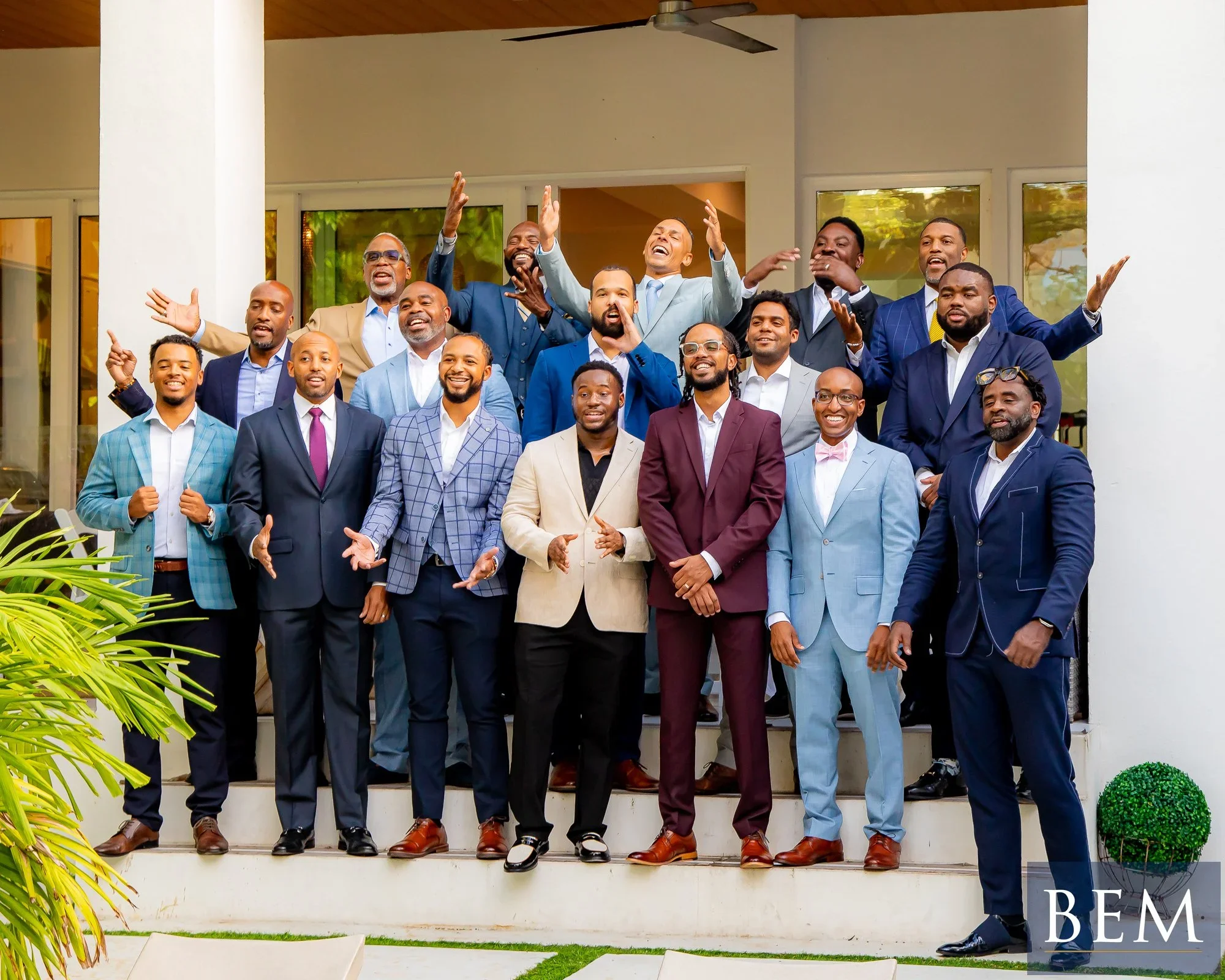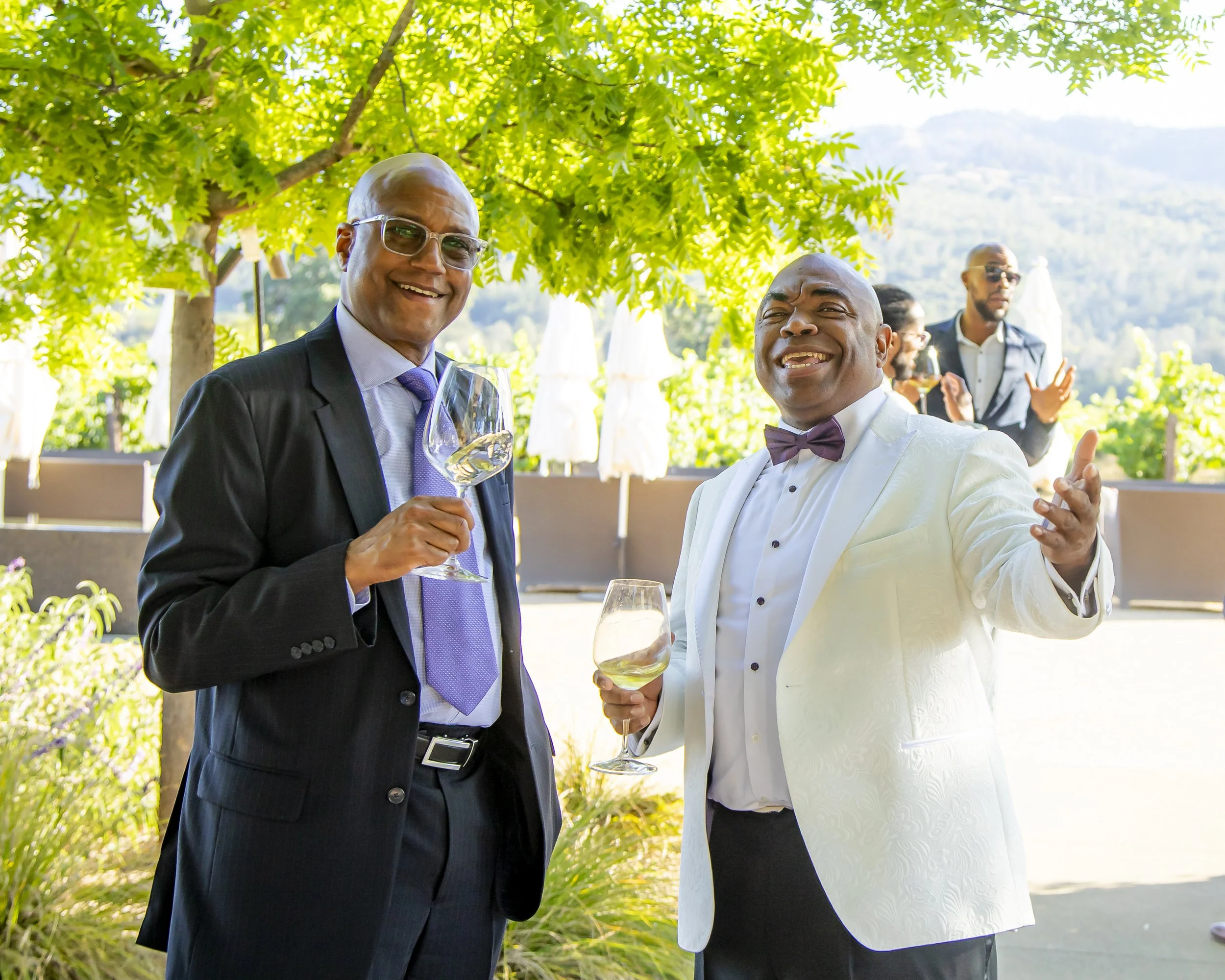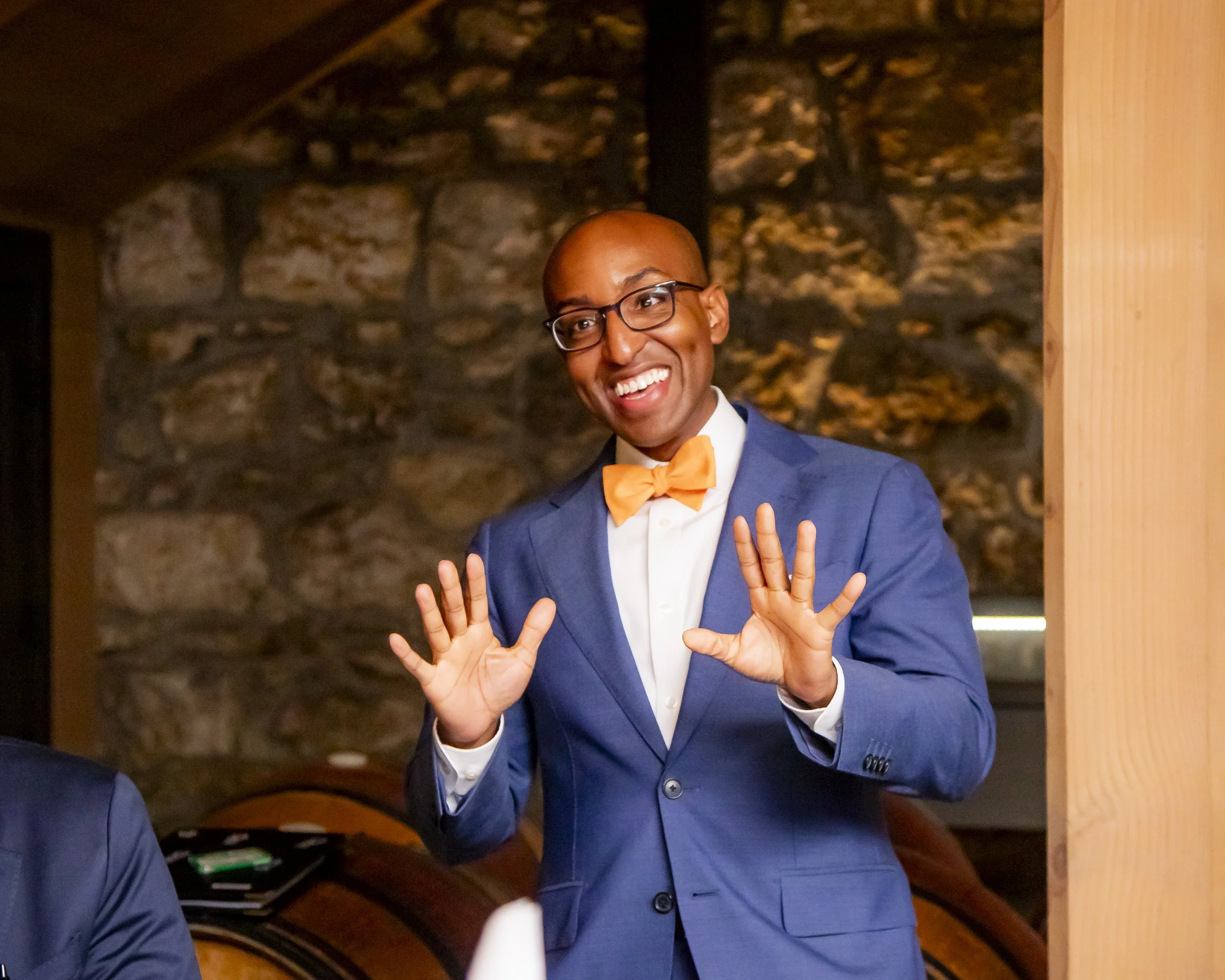A Napa Experience: Black Executive Men Celebrates First Year
By Leroy Adams
Photo credit: kvonfoto
In just twelve months, this collective of Black GPs, LPs, and entrepreneurs has created one of the most culturally powerful—and financially serious—movements in private equity.
Napa Valley Private Equity Dinner
Photo credit: kvonfoto
Under the bright Napa Valley sun, dozens of wine glasses were held to the sky by the members of the Black Executive Men Private Equity Network. It has been nearly one year since I wrote my first story about the then nascent Private Equity Network. Framed by the warmth of hand-crafted wood with the rich, earthy scent of the charred oak wood burning, mingling with the citrusy notes of orange peel and the deep warmth of bourbon, I sat in the Private Dinner room of Conversa watching as Black men—from the Vice President of Finance, seated high in the C-suite, to the First Time Fund Manager building his portfolio—spoke candidly about the barriers faced within the Private Equity industry and also deal flow, with an air of success but also a drive for more.
One year later, surrounded by the Mediterranean-like climate Napa is known for—rolling golden hills kissed by the late-afternoon sun, endless rows of lush vineyards, and a warm breeze carrying the faint scent of lavender and ripe grapes—the men gathered with glasses raised in celebration. On the first day of the event, to my misfortune but not to my surprise, the men arrived for lunch at the Michelin-starred Auberge du Soleil, an “in-the-know” Napa restaurant renowned for its stunning views of the valley and the very vineyards responsible for the wine in their glasses.
The Napa Valley Private Equity Dinner, marking one year since Jewel Love and Jay Holmes put their vision for Black men in private equity into action, was a declaration. As Jewel shared:
“On July 10, we gathered in the vineyards for a private celebration of Black Executive Men in private equity. That deals will be done between us. That exits will be celebrated publicly. That capital will flow through our hands—globally. The men who stood here took the first steps toward a new chapter. And what we build from here will echo for decades.”
Photo credit: kvonfoto
This celebration carried the distinguishable ambiance of a Black Executive Men Private Equity event—luxurious, elegant, and intentional - curated for the GPs, LPs, lawyers, and investors supporting the Black Executive Men Capital mission. The men were sharply suited—tailored navy and charcoal suits, accented with silk pocket squares, custom cufflinks, and polished Oxfords. The food and wine were world-class, and as always, private equity took center stage.
With mountainous and lush green Napa vineyards as a backdrop, Jay Holmes, co-founder of Black Executive Men Private Equity, addressed the room with measured pride, echoing the prophetic vision that drives the network:
“We are now one year in the books with the Black Executive Men Private Equity and Black Executive Men Capital Network. What started as a conversation between Jewel and me about reaching the billion-dollar mark turned into a mission to help all brothers reach that mark. Since our launch, we’ve grown in members, shared more resources, launched joint ventures, and deployed real capital. We are creating a new normal.”
The message was clear: Black Executive Men Private Equity is here to build capital—strategically and collectively—with the style and community-focused approach that is trademark Black Executive Men. As they refilled their glasses with the finest Napa wine and shared plates of fresh, delicate meats, I walked around speaking with GPs, LPs, lawyers, and investors listening as the members reflected on their first year—and where this network is heading next.
INTRODUCTION
Private equity has long struggled with diversity at its highest levels. According to the 2024 State of the Business report from Third Way, a national think tank advancing centrist policy solutions, only 4% of Black investors hold key decision-making roles within venture capital firms. And when Black investors do lead their own funds, they often face steep barriers to capital—more than half of Black-led VC firms manage less than $50 million in assets, falling short of their fundraising goals and limiting their ability to scale.
Black Executive Men Capital (BEM Capital), launched in 2024, is on a mission to change the face of private equity through a model rooted in purpose, informed by lived experience, and driven by capital ambition. Their approach is simple yet radical: raise 100% of capital from Black men and reinvest it directly into Black-male-led businesses and GPs.
Their mission? To help 1,000 Black men collectively reach $1 trillion in assets under management (AUM) by 2030.
In its first year, the network has expanded to 25 cities—including three international locations—grown to 170 members, and facilitated deal-making across industries from tech to real estate. For Jay Holmes and Jewel Love , co-founders of Black Executive Men Capital, launching a private equity firm with a niche model was only half the work. Their distinct paths into private equity underscored a second, equally essential component needed to move the needle: community—the kind of intentional, culturally rooted ecosystem so many other firms have failed to offer Black men.
Photo credit: kvonfoto
Jay Holmes’ path began in Connecticut as a real estate portfolio manager, where he first saw the wealth-building potential of private equity real estate deals. But breaking into the upper tiers of private equity meant facing barriers few could overcome. “I didn’t have access to institutional capital, family offices, or accredited investors. Those relationships weren’t there for me,” Jay recalled. “That lack of access is why so many of us never get the chance to play this game at the highest level.”
Jewel Love’s journey couldn’t have been more different. A licensed psychotherapist, Jewel spent nearly a decade building a practice to support Black men in corporate America—helping them navigate the mental toll of isolation, microaggressions, and the pressures of leadership. Rooted in Jungian depth psychology and cross-cultural men’s initiation rites, his work revealed a clear truth: Black men needed more than therapy. They needed authentic community and access to the wealth-building strategies that could shape their futures and address the isolation.
Pictured: Jay Holmes, with years of experience as an Investment Broker and managing real estate portfolios, emphasizes the importance of relationship building.
Photo credit: kvonfoto
Thus, the Black Executive Men Private Equity Network—and signature gatherings like the Napa Valley event—was born. More than a series of meetups, it is an intentional ecosystem built to help Black male GPs form strategic relationships with LPs, lawyers, accountants, allocators, and institutional investors. These connections open the door to deal flow opportunities, capital raising, and long-term partnership. Through shared education, intentional networking, and a clear pipeline strategy, this network operates in lockstep with one bold mission: to help 1,000 Black men collectively reach $1 trillion in assets under management (AUM) by 2030.
Capital and community.
Pictured: Jewel Love originally founded Black Executive Men as a psychotherapy practice for Black men in corporate America, in 2015.
Photo credit: kvonfoto
Leaning on their individual strengths and collective ambitions, Jay and Jewel have sparked a vision that has resonated with thousands of Black men—from the boardrooms of Wall Street to LaSalle Street in Chicago, and across the Atlantic to the pubs of London’s Canary Wharf and the upscale who's-who gatherings at the Golden Ice Runda, Nairobi’s ultimate luxury hangout.
MOMENTUM IN YEAR ONE
Pictured: In 2024, BEM held their Private Equity Event Weekend in Miami, FL.
Photo credit: kvonfoto
I walked across the grass, shimmering in the afternoon sun, attempting to catch Jewel for a quick interview. As I did, a brother who would introduce himself as Leonard Fom caught my attention. While most of the men sported suits and ties, Leonard stood out in a deep purple African Senator Kaftan that appeared navy blue beneath the Napa sun. When I asked Jewel why he believes this network resonates so powerfully with Black men, he touched on one of the core issues the industry has long failed to address:
“Relationships are the foundation of Black Executive Men Private Equity Network, and it’s something we’re committed to developing intentionally over the years. It’s truly our secret sauce.”
While specific capital metrics remain closely held—as is common in the private equity world—the early story of Black Executive Men Private Equity Network is best told through its remarkable growth, global presence, and the voices of GPs, LPs, lawyers, and investors who have already embraced the network as home.
Voices of the Network
Leonard Fom, Founder
One of those men is Leonard Fom, founder of FinOps Squad, an award-winning consulting firm providing fractional CFO services to high-growth companies. He traveled from England for the Napa event. “I learned about the network on LinkedIn. I was inspired by the network they’re building and the opportunities they’re creating in private equity. I wanted to experience the network in person and start to build the relationships they're known for. I’m looking forward to having the men hosting an event in England and expanding with brothers there.”
Pictured: Leonard Fom (right) traveled from England to attend the event.
Photo credit: kvonfoto
Harland Abraham, Vice President of Development
As Harland Abraham, VP of Development at the National Association of Investment Companies (NAIC), who attended the Miami event in 2024, aptly put it: “We’re not asking for a handout. Jewel and Jay are building something unprecedented—an ecosystem where wealth creation, professional growth, and community impact go hand in hand. Their bold mission promises to shift the wealth paradigm and create lasting generational legacies for Black men in private equity—ensuring that the 5% is just the beginning.”
Sam Kelly, Investor and Managing Director of Solomon Gideon Capital
Sam Kelly, whom I caught up with at the network’s Open Capital event in New York earlier this year, spoke to the value he finds from the network: “BEM Capital Network has been great for me. Having someone who understands your context is beautiful and necessary. There are many hurdles and not always a guide for us [Black men] in these unique career paths. This network helps me grow personally and professionally.”
Cusaj Thomas, Private Equity and M&A Attorney at Goodwin Procter
Cusaj Thomas, also in attendance for their New York event, spoke to the power and representation of the network when sharing why his firm became a sponsor: “This is a powerful organization doing powerful things in a powerful space,” he said. “In many rooms I walk into, I don’t see other Black men. Tonight, I’m surrounded by them—and they’re managing millions. They’re building a strong community, and you have to support it. The start was in private equity, but it’s expanding. I’ve been in private equity my entire career and I’ve never seen anything like this. That’s what makes it unique.”
Pictured: Cusaj Thomas, BEM Private Equity Network member, addresses the network at BEM’s New York Open Capital event.
Photo credit: kvonfoto
Dr. Barry Braxton, Director of TMI & Partners
Dressed in a finely tailored white jacket, black pressed slacks, and a purple bow tie to bring it all together, Dr. Braxton, with his usual joyous energy and contagious smile, took a sip of the silky 2022 WALT Chardonnay. The aroma of citrus and melon flavors captured my nostrils as I approached him. “We’re doing it,” he announced before I could get a question out. “The capital is growing. We’ll beat our 2030 goal.”
He was speaking to Black Executive Men’s goal of “1,000 Black men reaching $1 trillion AUM collectively” while reaffirming his purpose and reminding me why he’s a part of this network: “When I heard they had 1,700 businesses looking to raise nearly $850 million, I said, ‘I want to write the check for that,’” he shared. “If they 4X or 8X that—it could be trillions. And I want to be part of that growth.”
Pictured: Dr. Barry Braxton (right) and Martin Johnson, Esq. (left)
Photo credit: kvonfoto
In private equity, credibility is ultimately measured by capital—how it’s raised, how it’s deployed, and the exits it creates. Stories of community, representation, and unity are powerful, but they are not enough unless they are backed by sustainable economic outcomes. Still, Black Executive Men has quickly built a thriving online presence - something new brands often struggle to do - regularly receiving hundreds of likes and comments on posts recapping upscale events, high-level networking sessions, new member announcements, and video clips featuring podcasts, career advice, and insights from Black men in private equity and business.
As one commenter on LinkedIn put it:
“A powerful display of excellence and unity. To the brothers who showed up in Napa—not just in presence, but in purpose—you carried the standard with grace. This is intentional leadership. Salute, gentlemen, for expanding what’s possible for Black Executive Men. The ripple effect is real.”
Photo credit: kvonfoto
As tends to happen with niche, high-impact content, Black Executive Men’s Private Equity message has started to reach new audiences. It has led to exploratory partnership calls with the Young Presidents’ Organization (YPO) and reshares of their resonant content by the Executive Leadership Council, a cornerstone institution of Black executive leadership. If establishing their name and brand was the primary goal for year one, they can proudly check that box.
As they deploy capital and share resources—from Nairobi to London to Wall Street—the members of the network have made one thing clear: their commitment goes beyond visibility. “We’re here to make and move money.”
THE CULTURAL FOUNDATION
For Jay and Jewel, elevated experiences are essential to the mission. Creating environments that affirm the worth, brilliance, and ambition of Black men is central to how they build capital, community, and impact.
After an afternoon spent walking the sun-drenched vineyards of Napa Valley—where the climate carried warm breezes and the air was scented with ripened grapes—the men of Black Executive Men transitioned from open fields to the intimate setting of HALL St. Helena’s historic wine cellar. The shift from the rolling hills to the dimly lit, barrel-lined room felt symbolic: moving from wide-open dreams to the focused, intentional work of building something lasting. Conversations that began under the bright Napa sun continued around the long wooden table, now deepened by the weight of legacy-building and the richness of wine poured from the very barrels surrounding them.
The room exuded both luxury and warmth, setting the perfect tone for an intimate yet powerful evening. At HALL St. Helena, nestled within the historic Bergfeld Vineyard at the base of the Mayacamas Mountains, the men entered the room and settled in at the table.
Photo credit: kvonfoto
The space, framed by rustic stone walls and rows of oak wine barrels, carried a sense of heritage and craftsmanship. A long, gleaming wooden table stretched across the center of the room—its natural grain glowing under the soft golden light of the hanging orbs above, casting a warm, ambient glow. Each place setting was carefully curated: crisp white napkins, polished cutlery, and rows of crystal glasses catching the flicker of candlelight.
It was the kind of space where conversation felt richer and deals felt closer—where the history of fine winemaking met the future of Black capital-building. Fresh from their tour of the winery, the men sat surrounded by the scent of aged wine and polished wood, ready to toast to their historic moment and the collective vision of wealth, community, and legacy.
Photo credit: kvonfoto
Luxury, Trust, and the Power of Place
For Jewel Love and Jay Holmes, co-founders of Black Executive Men Private Equity, building a platform for mission-driven Black men to create wealth and elevate their communities is inseparable from curating elegant, luxury experiences that affirm their worth and foster trust.
“As Black men, we have every right to be in high-end, well-curated spaces,” Jewel explains. “If you’re dealing with private equity, you’re talking about successful people who enjoy nice things. Luxury has to be part of the experience. It’s not excess—it’s alignment.”
Pictured: Adam Edwards gently sniffs his wine after sharing the importance of wine culture in business with the group.
Photo credit: kvonfoto
The founders understand that capital moves on trust, and trust is built in spaces that inspire confidence, connection, and vision. This is why the network intentionally hosts its events in locations that evoke excellence: from a contemporary Manhattan art gallery where deals are discussed under the gaze of Black fine art, to a Miami pool house where casual conversation turns into joint ventures, to the serene hills of Napa Valley where the scent of oak barrels and Cabernet sets the tone for strategy.
One of the men shared his thoughts: “These luxury gatherings are about signaling that we belong here—and we’re building something of value. When you share a meal in a beautiful setting or toast over fine wine, there’s a sense of belonging that can’t be faked. And from that belonging, real partnerships emerge.”
Photo credit: kvonfoto
The travel element isn’t just an aesthetic choice; it’s strategic.
According to Black Enterprise, Black travelers spend over $145 billion annually, with Black business travelers contributing significantly to that figure. Average annual meetings spend exceeded $2 million for respondents in 2024, with 7% reporting expenditures over $5 million. Black Executive Men is leaning into this growing market, creating destination experiences that combine lifestyle and impact, culture and capital. With that intentionality, their presence has become an economic force in itself, with their dollars supporting Black chefs in Miami, amplifying Black artists in Manhattan galleries, and celebrating the close of their Napa Valley event with cigars, Black-owned. As a writer focused on the intersection of travel and culture, I’m excited by the potential impact a large-scale Black Executive Men Private Equity Network summit could have on a local economy.
This sort of purpose-driven work often leads to little rewards—like the men learning about the legacy of Black agricultural workers in Napa Valley. Before Napa became a wine capital, California's agricultural economy relied heavily on Black labor. After Emancipation, many Black families migrated west during Reconstruction and the Great Migration, settling in areas like Napa and Sonoma to escape the terror of the Jim Crow South. Their hands helped shape the land long before it held international prestige. Today, Black-owned wine labels—including the renowned Brown Estate, the first and only Black-owned estate winery in Napa—stand as living testaments to that legacy. Several men—with the economic resources to help scale a thriving winery—expressed regret about not knowing about the vineyard before their visit, but were excited to partner for next year’s event. Proof that the work of reclaiming space, wealth, and heritage is always evolving, and always worth it.
The Vision
Dominique Carroll, Partner at Fox Rothschild and a member of Black Executive Men Private Equity, stood confidently in the wine cellar of HALL St. Helena, the warm glow of the room’s lighting reflecting off his tailored mustard suit. With a glass of cabernet in hand and animated hand gestures, he emphasized the critical role of legal expertise in high-stakes private equity deals.
“For BEM members, having experienced legal counsel isn’t optional—it’s essential,” Dominique said, his tone both measured and firm. “From intellectual property to acquisitions, mergers, and exits, these are the areas where deals are made or lost. My team ensures that every member and every business has access to the legal structure and protection necessary to scale successfully.”
Pictured: Dominique Carroll
Photo credit: kvonfoto
As Dominique sat down to a cellar full of applause echoing off the rustic stone walls, I turned to my left to catch the quiet affirmation from one of the newest members: “This is what I need,” he said with a breath of excitement. A former professional basketball player, he had recently launched a firm helping collegiate and international athletes manage NIL deals and global brand partnerships. While he understood the game and the business behind it, he lacked expertise in contracts, IP protections, and international legal navigation. Dominique’s message spoke directly to his needs—and in that moment, Black Executive Men had created another powerful connection.
CAPITAL, CULTURE, GLOBAL
The conversations at HALL St. Helena was about celebrating the first year, and the next decade.
“Since starting Black Executive Men back in 2015 as a therapy practice for Black men in corporate America, I’ve learned that Black men want to come together in a way that represents their internal life—culture, style, luxury—and their external business identity,” said Jewel Love. “Other networks offer one or the other. Our hybrid model offers both. Men are hungry for it, and they appreciate it, so we’ll keep building with that at the center.”
As an illuminating moon settled over the rolling hills of Napa, the men of BEM stepped outside for what has become a hallmark of their gatherings—the cigar ceremony. The glow of the lighter sparked against the evening sky as the rich aroma of premium tobacco mingled with the crisp California air. There’s a ritualistic elegance to this moment. In the world of business, cigars have long symbolized success, power, and reflection. For Black Executive Men, the ceremony is more than tradition—it’s an act of slowing down, of celebrating victories while contemplating the road ahead.
Photo credit: kvonfoto
Watching them, suited in tailored navy, white, and burgundy blazers, glass of wine in one hand and cigar in the other, it was clear that these moments embodied the essence of Black Executive Men: sophistication, brotherhood, and intentionality. Just as private equity deals take time to cultivate, a cigar forces you to slow down, savor, and reflect on the bigger picture. As one member told me with a smile: “Some of our best ideas and partnerships start right here—with a cigar, a glass of wine, and real conversation.”
For me, as a writer who covers the intersections of travel and culture, this first-year reflection is about witnessing a modern extension of Black internationalism. The way Black Executive Men moves—from Manhattan art galleries to Miami pool houses, from Napa Valley wine cellars to global activations in London, Accra, and Dubai—evokes a long-standing legacy of Black economic cooperation across borders. This is business and brotherhood traveling together, building a cultural and financial footprint that is both rooted and global. These events have become cultural markers, affirming that Black excellence belongs everywhere, including at the highest levels of global finance.
Jay and Jewel, the founders, understand a critical reality of private equity: capital validates credibility. Community, style, and representation are essential, but without sustainable economic impact, they remain hollow buzzwords. What Black Executive Men is building—a private equity firm (BEM Capital) paired with a powerful ecosystem (BEM Private Equity Network)—is rewriting the script. By raising 100% of their capital from Black men and reinvesting directly into Black-led funds and businesses, they are proving that capital and culture amplify each other.
WHAT’S AHEAD
As Black Executive Men steps into its second year, the question now is how vast BEM’s influence can become. Will the network grow into a global capital powerhouse, setting new precedents in London, Dubai, Nairobi, and Accra? Can its collective influence push policy changes in private equity and venture capital—creating pathways that ensure the 5% of senior roles held by Black professionals becomes 15%, 20%, or more? Could it help bridge the gap so that the less than 1% of venture funding currently reaching Black founders finally reflects the talent, ideas, and scale of Black entrepreneurship?
In the hills of Napa, I saw the foundation of something larger than a network. I saw a movement deliberately blending elegance, culture, and strategic cooperation to create economic power that can travel the world. As Jay told me that evening: “We’re not just building a fund. We’re building a future where our success creates more success.” And with every handshake, toast, and deal, that future feels closer than ever.

